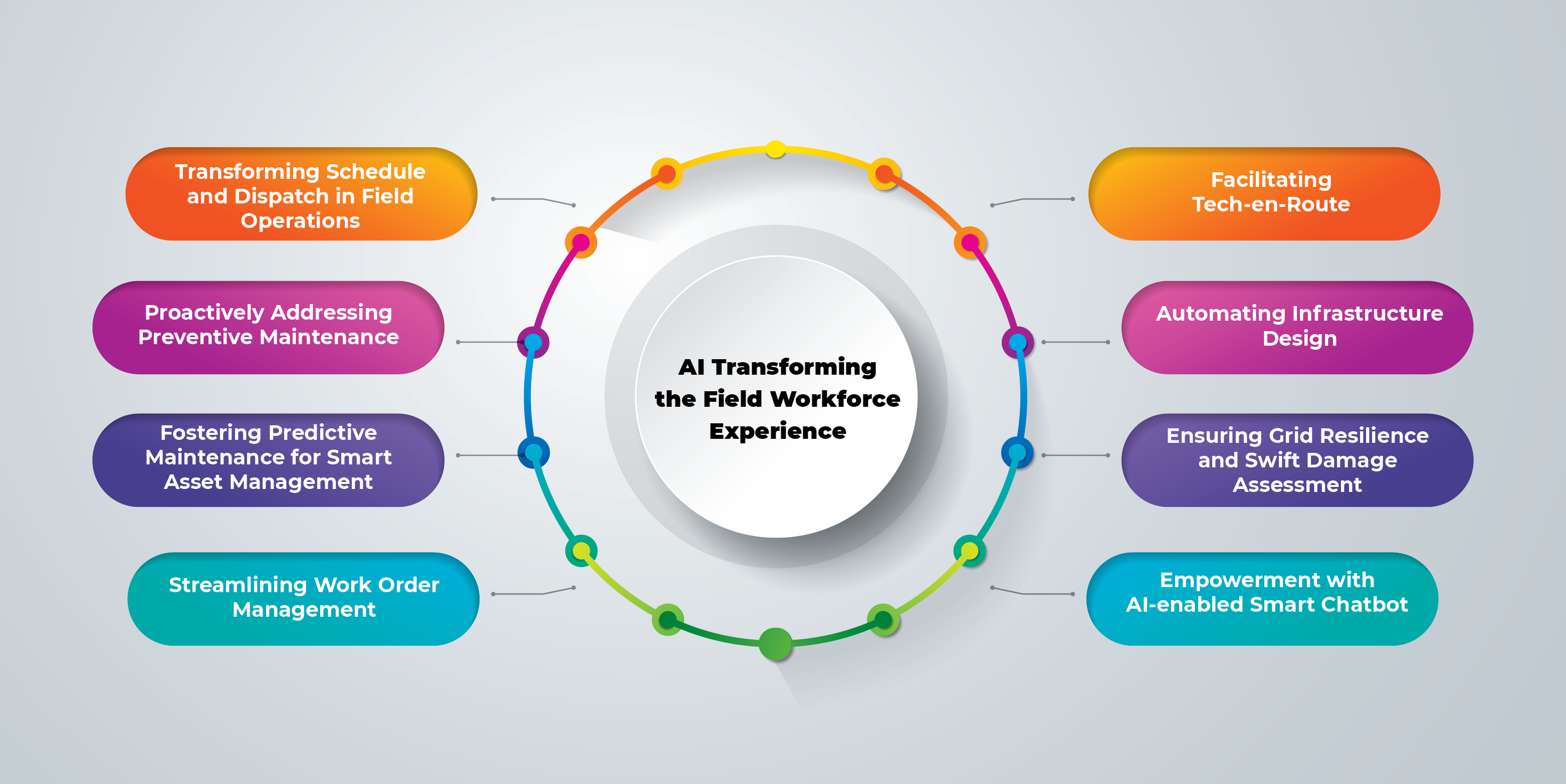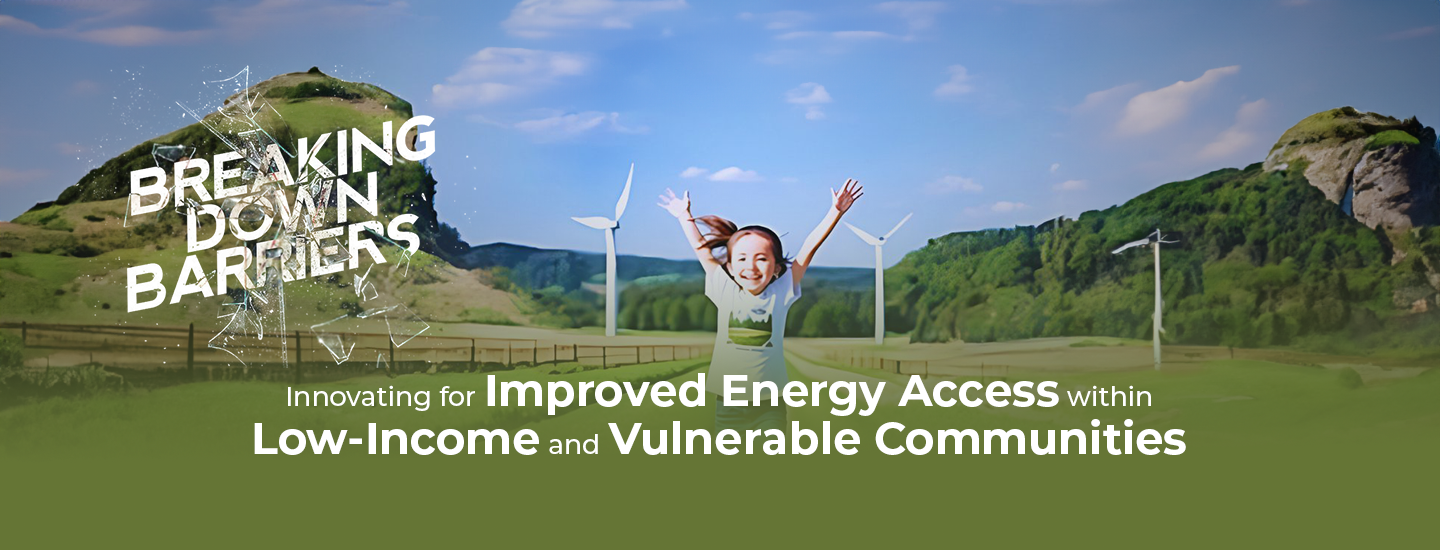Transforming Utility Field Workforce Experience with AI

In the world of utilities, where keeping things running smoothly is critical, field service management plays a crucial role. Streamlined field services are vital to ensure utility infrastructure stays intact, services are delivered without a hitch, and operations run like clockwork so the customers can receive uninterrupted benefits.
However, technology innovation is the most anticipated transformation in the current scenario across the utility industry. This transformation in the field workforce aligns with the broader trend where utilities must consistently evolve to adapt and thrive, ensuring smooth operations and elevated service delivery.
The landscape of fieldwork is undergoing a metamorphosis from operational methods to the tools at play, and at the heart of this transformation lies artificial intelligence (AI). Whether it's automation, maintenance and repairs, data analytics, predictive operations, or remote monitoring, AI is reshaping the field workforce experience, introducing efficiency and innovation to the forefront.

As artificial intelligence advances, workforce operations have evolved to become more intelligent. Let's explore some innovative use cases where AI is making a remarkable difference in field workforce experience:
- Transforming Schedule and Dispatch in Field Operations
The AI-powered Schedule and Dispatch enables the right-fit technicians for the work orders at the right time based on informed parameters and historical data. Some of the applications of AI in Schedule and Dispatch range across:- Short cycle work that needs to be completed daily, such as meter installation, meter inspection, and more.
- Long cycle work is planned that is executed over a long period, such as new construction and tower buildout.
- Outage Management for responding to outages and disruptions across different locations.
- Inspection and Maintenance to manage and maintain assets. The benefits of AI-powered Schedule and Dispatch include an increase in first-time fix rates, an increase in the number of work orders completed daily, a reduction in resolution time, and improved workforce efficiency and customer satisfaction.
- Proactively Addressing Preventive Maintenance
AI’s anomaly detection and pattern recognition capabilities predict asset maintenance needs and potential failures by leveraging data analysis of sensors, equipment, and other infrastructure components. It anticipates the issues to minimize service disruptions, ensuring a seamless workflow. The technicians are equipped with real-time alerts and recommendations based on their performance, allowing them to take proactive steps to prevent failures. - Fostering Predictive Maintenance for Smart Asset Management
As various equipment and assets, such as transformers and meters, are susceptible to wear and tear, a health check-up is essential. This process relied heavily on manual procedures in the past, but today, AI takes the lead in predictive equipment degradation analysis, foreseeing potential issues before they escalate into major problems. It also generates detailed reports, including equipment maintenance or replacement recommendations, helping utilities avoid costly breakdowns. - Streamlining Work Order Management
An AI-enabled automated work summary management delivers a daily pre-work summary to field workers, with an overview of their entire shifts. The workers can start their day fully informed, with access to schedules, job details, and potential issues they might encounter on the job. This consolidated information streamlines their job, minimizes manual risks, and improves productivity by automating recurring tasks. - Facilitating Tech-en-Route
AI aids field technicians in seamless navigation through route optimization, analyzing traffic patterns and weather conditions through GIS-integrated capabilities. This strategic approach allows utilities to leverage historical data, set up smart forecasting, minimize travel time, enhance fuel efficiency, and prioritize worker safety during their journey to the site. - Automating Infrastructure Design
Designing efficient infrastructure requires massive manual inputs. This is old news! With the power of AI, infrastructure design has become seamless and automated. AI provides an optimized infrastructure design layout for maximum efficiency, reducing energy loss in the electrical grid or minimizing water leakages.- Adaptive Design: AI can provide designs for electrical grids, water distribution systems, and transportation networks, ensuring optimized layouts for maximum efficiency, including site suitability analysis.
- Cost Analysis: AI can play a crucial role in evaluating the cost considerations associated with designing infrastructure, encompassing material and labor costs, as well as construction timelines, with developing efficient layouts.
- Workload Planning & Demand Forecasting: AI enables proactive anticipation of equipment failures, optimization of maintenance, and dispatching technicians pre-emptively to address potential issues. Moreover, intelligence demand forecasting enhances workforce utilization resource prioritization and facilitates informed decision-making for hiring and training.
- Ensuring Grid Resilience and Swift Damage Assessment
AI powers grid resilience by simulating the impact of disasters and extreme weather events such as hurricanes, snowstorms, and wildfires on the grid and generating disaster scenarios and response plans. It provides real-time response support and resource allocation while recommending eco-friendly disaster recovery strategies. AI also helps balance the grid load based on real-time network traffic patterns. It detects unusual traffic patterns and generates adaptive load-balancing rules, thus preventing overloads and outages. This proactive approach to grid resilience and disaster recovery ensures minimal disruptions during extreme events. - Empowerment with AI-enabled Smart Chatbot
In addition to providing seamless assistance to utility customers, AI chatbots empower the field workforce by optimizing shift schedules, generating maintenance schedules, and identifying assets requiring attention to improve their overall productivity.
Artificial Intelligence’s role in field workforce experience is nothing short of transformational. By leveraging AI, utilities can revolutionize their field operations, reduce costs, and enhance productivity, ultimately delivering a superior experience to their workforce. With AI as a strategic ally, the utility industry can usher in a new era of efficiency, cost-effectiveness, and an empowered workforce excelling in their roles.
At SEW, we are at the forefront of the digital transformation. Our #1 Digital Workforce Experience (WX) platform, Smart WX, helps intelligently manage field operations, making the operations efficient and seamless for the field workforce and the utilities. Smart WX leverages the power of AI-ML Analytics for a seamless experience.





